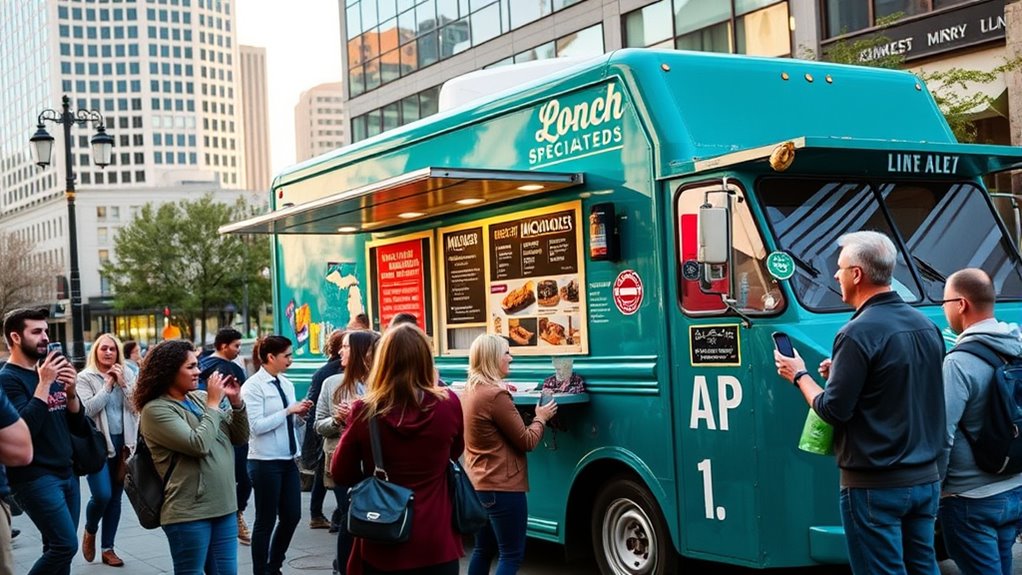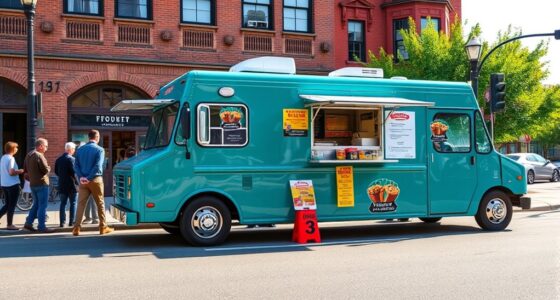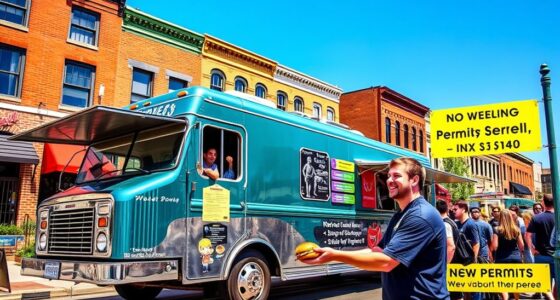To open a food truck in Grand Rapids, you’ll need a Mobile Food Vendor License, proof of insurance, and menu approval from health authorities. Budget between $30,000 and $175,000 for your truck and equipment, plus permits and compliance costs. Choose locations carefully, respecting zoning and safety rules. Develop a food-safe menu and leverage social media and local events for marketing. Ensuring safety standards and insurance are met is essential — if you continue, you’ll discover how to make your food truck thrive.
Key Takeaways
- Obtain a Mobile Food Vendor License, proof of Food Protection Manager Certification, and liability insurance, displaying permits visibly on the truck.
- Budget approximately $30,000–$175,000 for the truck, equipment, permits, and ongoing expenses like insurance and permits renewal.
- Comply with zoning laws, avoid restricted areas near schools and parks, and secure necessary permits for chosen operating locations.
- Develop a compliant menu approved by health authorities, ensuring food safety standards and accessible documentation during inspections.
- Use social media, participate in local events, and implement geofencing and loyalty programs to effectively market your food truck.
Navigating Permits and Licensing Requirements in Grand Rapids
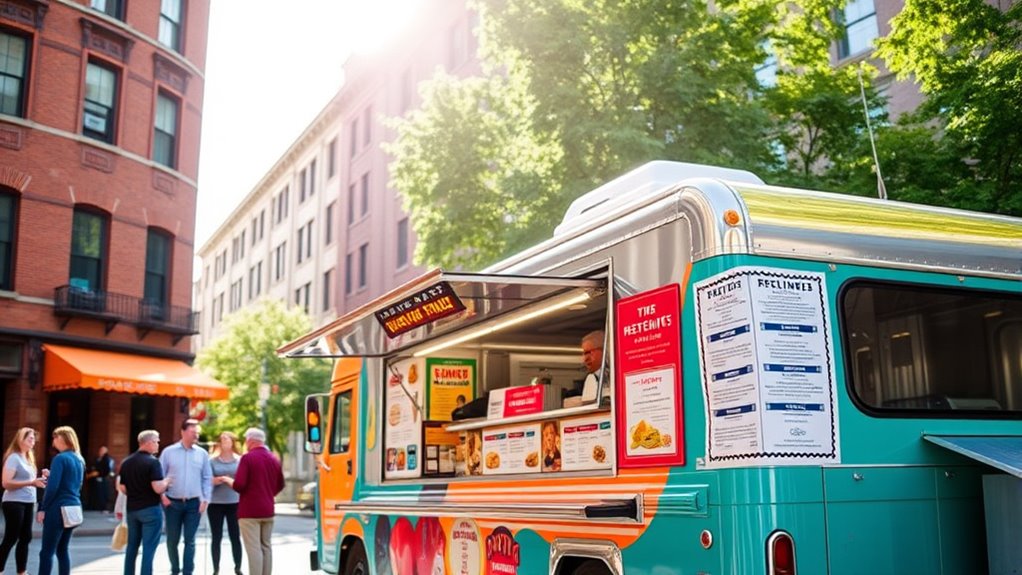
Managing permits and licensing in Grand Rapids might seem complex, but with clear steps, you can get your food truck up and running smoothly. First, you’ll need to obtain a Mobile Food Vendor License from the city. The application requires proof of a Food Protection Manager Certification from the Michigan Department of Agriculture & Rural Development. You’ll also need to show proof of $1 million in general liability insurance and motor vehicle coverage, with the city listed as additional insured. Make sure to display your permit visibly on your truck during operation. To qualify, you must have a valid driver’s license and no outstanding debts to the city. These steps ensure you’re compliant and ready to serve customers legally within Grand Rapids. Obtaining all necessary permits and licenses in advance helps prevent potential fines or operational disruptions. Additionally, understanding permit renewal requirements can help maintain compliance over time.
Understanding the Costs Involved in Launching Your Food Truck
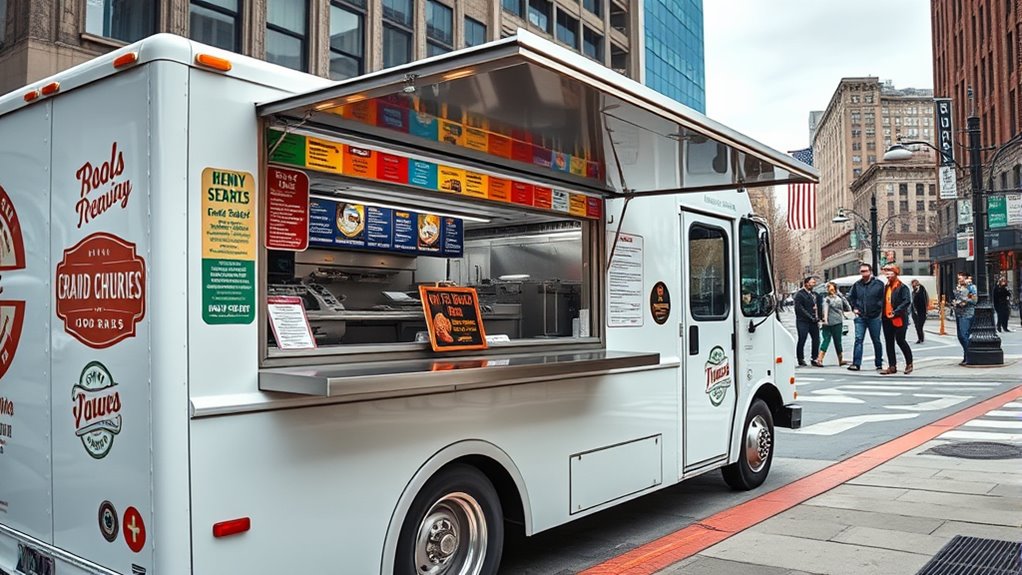
Starting your food truck requires a clear understanding of the initial investment and ongoing costs involved. From purchasing and outfitting your truck to covering licensing, insurance, and daily expenses, each factor impacts your budget. Being prepared for these costs helps you plan effectively and set your business up for success. Additionally, understanding the Michigan food truck laws and regulations ensures compliance and prevents costly penalties down the line. Implementing effective fraud prevention tools during transactions can also safeguard your revenue as your business grows.
Initial Investment Expenses
Launching a food truck in Grand Rapids requires a significant initial investment, with costs varying based on your choices and needs. New trucks range from $50,000 to $175,000, while used vehicles cost between $30,000 and $70,000, often with added customization and retrofitting expenses. Essential kitchen equipment, such as grills, fryers, ovens, and refrigeration, can total $5,000 to $20,000 or more. Licensing fees include a $361 application for a mobile food vendor license and additional costs for permits, inspections, and decals. Renting a licensed commissary kitchen typically costs $300 to $1,200 monthly. Technology investments, like POS systems and branding, range from $1,000 to over $5,000. These initial expenses establish the foundation for your food truck business in Grand Rapids. Considering local market demand and regulations, it is advisable to budget extra funds for unforeseen costs during setup and ensure compliance with all local requirements.
Ongoing Operational Costs
Once you’ve covered the initial setup costs, maintaining your food truck’s daily operations introduces ongoing expenses that can substantially impact your profit margins. Licensing and permit renewals are regular, with costs like $361 for your mobile food truck license and $238 for special event permits. Food and inventory costs fluctuate based on menu and customer volume, often running several hundred to thousands monthly, plus software subscriptions from $50–$200. Fuel expenses range from $500 to $1,000 monthly, with routine maintenance and unexpected repairs adding to costs. Insurance premiums, safety compliance, and equipment upkeep also require ongoing investment. Additionally, marketing efforts such as POS systems, permits, event participation, and advertising contribute to steady overhead. Managing these expenses carefully guarantees your food truck stays profitable and compliant. Effective expense management is crucial for long-term success in the competitive food truck industry. Maintaining a well-organized cost control system helps prevent overspending and ensures profitability as your business grows.
Finding the Perfect Locations and Zoning for Food Truck Operations

Finding the perfect location for your food truck involves understanding Grand Rapids’ zoning laws and selecting sites that balance visibility, accessibility, and compliance. The city classifies mobile food vending as *temporary concession sales*, with specific regulations on where you can operate, permit requirements, and operating hours. You’ll need permits for public property, like parks and downtown zones, and written permission for private property. Zones vary; downtown allows operation from early morning to late night, while industrial zones may permit 24-hour service. Restrictions often apply near schools, parks, and busy intersections to prevent conflicts. Ensuring your location adheres to site plans, parking rules, and safety regulations is essential. Proper zoning knowledge helps you avoid violations and set the stage for a successful food truck venture. Food truck regulations also include considerations for outdoor lighting and other safety standards, which can impact your choice of location and operational hours. Staying informed about regulatory compliance ensures your business runs smoothly without legal issues.
Crafting a Safe and Compliant Menu for Local Regulations
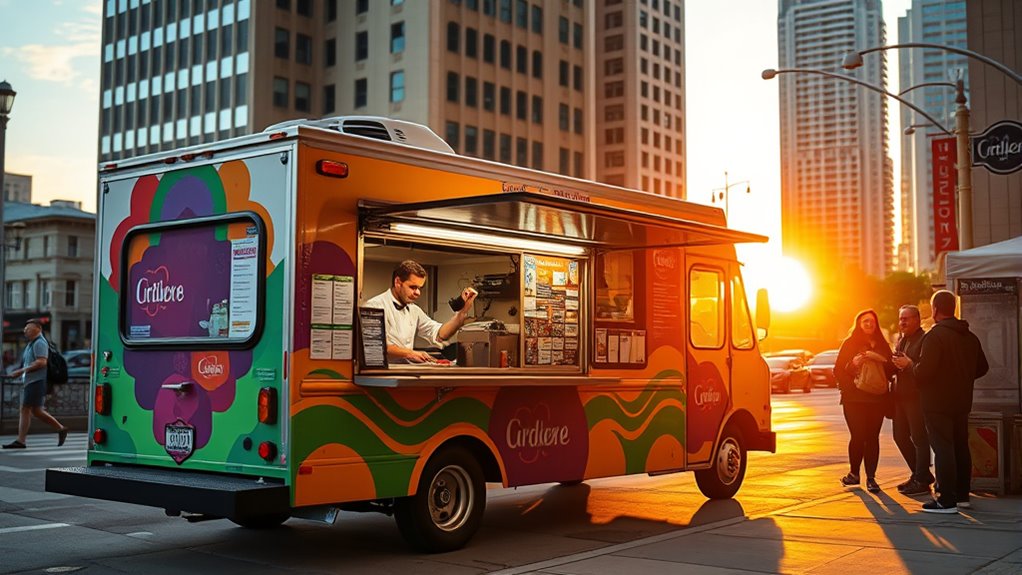
To make certain your food truck operates legally and safely, you need a menu that meets local health standards and gets approved by the health department. You’ll also have to keep documentation like SOPs and menu approvals accessible during inspections. Focusing on food safety standards and menu approval from the start helps prevent issues and keeps your operation compliant. Understanding the specific regulations for your city or county ensures that your menu complies with all local requirements. Additionally, paying attention to color accuracy can help ensure that your menu displays appealing and accurate images of your offerings, which can influence customer choices.
Food Safety Standards
Ensuring food safety standards are met is essential for operating a compliant and trustworthy food truck in Grand Rapids. You must have a handwashing station and a waste disposal system to maintain hygiene and prevent contamination. Regularly clean and sanitize all food-contact surfaces, and guarantee a reliable supply of potable water for cleaning, prep, and handwashing. Store cleaning chemicals properly to avoid cross-contamination. Your refrigeration systems need to keep perishables below 41°F, with temperature monitoring devices in place. All food must be stored correctly, following FIFO principles, at licensed commissaries. Additionally, installing an automatic fire suppression system, training staff for emergencies, and passing fire safety inspections are mandatory. At least one person must have a Food Protection Manager Certification to ensure compliance with local health and safety regulations. Proper planning of food safety standards can help prevent costly violations and ensure customer trust.
Menu Item Approval
Have you prepared a menu that complies with Grand Rapids regulations? You need to submit your menu along with your Mobile Food Vendor License application. Make certain it includes detailed descriptions and prices, and keep a copy visible during operations and inspections. Any menu changes require prior approval from the Kent County Health Department. Your menu must align with approved food preparation locations and procedures, matching the equipment on your truck, like refrigeration and waste disposal. It’s essential to choose menu items that meet sanitation standards and fit within your truck’s capabilities. Also, avoid ingredients or methods that pose higher regulatory risks without proper facilities. Be prepared to submit standard operating procedures and keep all documentation up to date for health inspections and licensing compliance.
Effective Marketing Strategies to Grow Your Food Truck Business
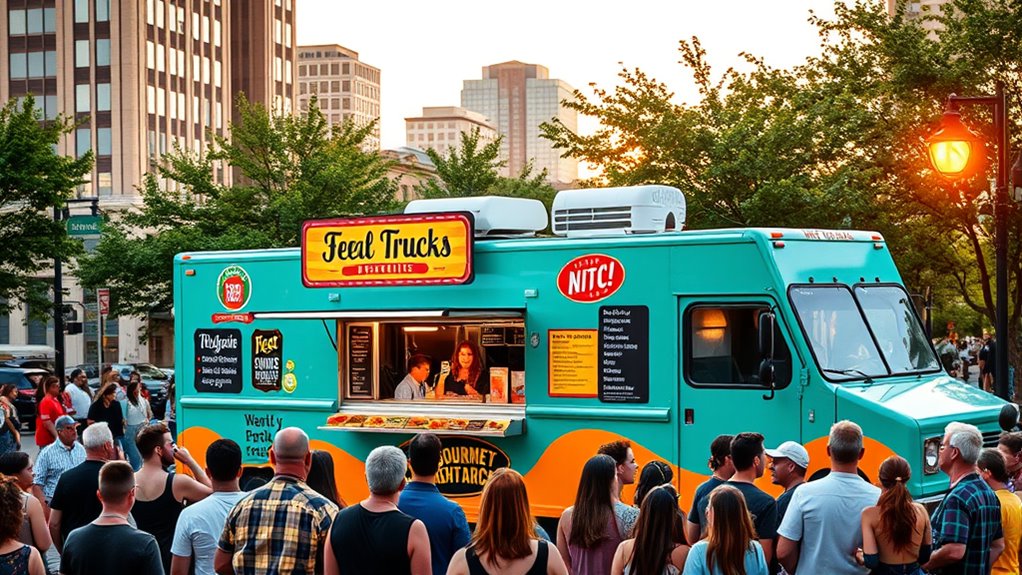
Effective marketing is essential for growing your food truck business in a competitive landscape. To stand out, leverage social media platforms like Facebook, TikTok, Instagram Reels, and YouTube Shorts to showcase daily specials and behind-the-scenes moments. Engaging content, contests, and live cooking sessions can boost foot traffic and customer loyalty. Participating in local events and food festivals—80% of food trucks do this—significantly increases visibility and sales. Use geotargeted ads and geofencing technology to connect with nearby customers. Additionally, implementing loyalty programs and email marketing helps retain customers and encourages repeat visits. Incorporating seasonal and holiday-themed promotions can lead to a 25% rise in customer visits, further boosting your business. To enhance your outreach, understanding local regulations and permits is crucial for compliance and smooth operation. By combining these strategies, you’ll build a strong local presence, attract new customers, and grow your food truck business effectively.
Ensuring Insurance and Safety Standards Are Met
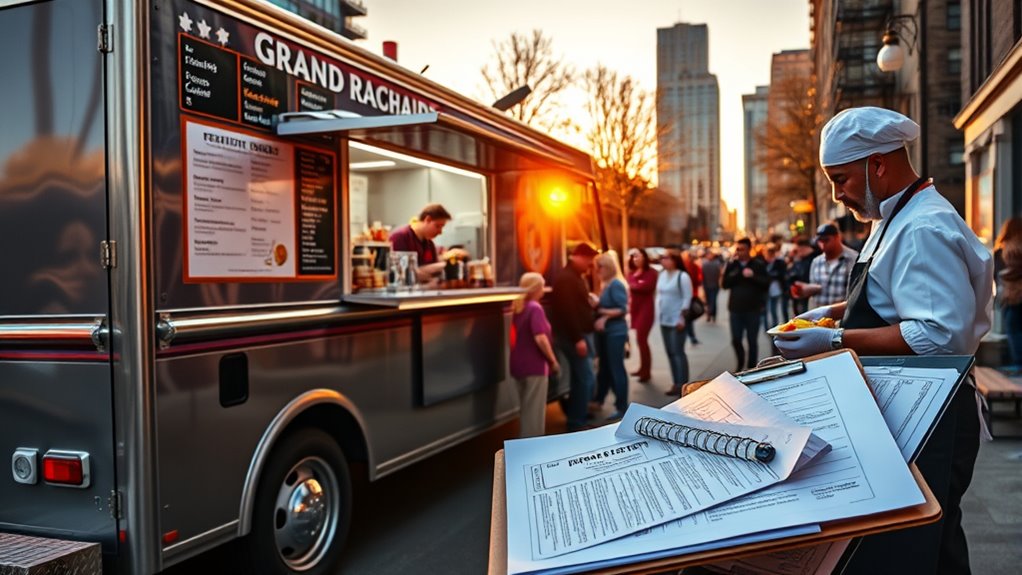
Meeting insurance and safety standards is essential for operating your food truck legally and safely in Grand Rapids. Michigan requires food trucks to carry liability and property damage insurance to protect against claims from accidents, injuries, or property damage. Many local events and commissaries also demand proof of insurance before approval. You’ll need general liability coverage, which protects against customer injuries and damages, and property insurance for your truck and equipment. If you employ staff, workers’ compensation insurance is necessary. Regular health inspections ensure compliance with safety standards, including proper food handling, sanitation, and equipment maintenance. Always display your proof of insurance and keep documentation updated. Having proper insurance coverage can also help you meet licensing requirements and avoid fines. Ensuring compliance with safety standards is crucial for maintaining your license and avoiding operational disruptions. By meeting these requirements, you safeguard your business, comply with regulations, and ensure a safe environment for both staff and customers.
Frequently Asked Questions
How Long Does the Permit Approval Process Typically Take in Grand Rapids?
You’re wondering how long the permit approval process takes in Grand Rapids. Typically, it’s about 10-15 business days after submitting a complete application, but delays can happen if there are missing documents, issues during health inspections, or zoning concerns. To expedite things, verify your application is thorough, schedule inspections promptly, and stay prepared to address any questions or corrections quickly. Planning ahead helps avoid unnecessary delays.
Are There Specific Restrictions on Menu Items for Food Trucks in the City?
Your menu isn’t just a list of options; it’s a battlefield where restrictions can unexpectedly pop up! In Grand Rapids, you must stick to approved foods, avoid high-risk items like raw seafood, and make certain everything meets health standards. Zoning laws also limit certain offerings near schools or parks. So, if you want to serve that daring dish, check first—because city rules might just put a stop to your culinary dreams!
Can I Operate My Food Truck Without a Commissary Kitchen?
You can’t operate your food truck without a commissary kitchen in Michigan, except for certain cases like STFUs or temporary event licenses. The law requires returning to a licensed commissary at least once every 24 hours to guarantee safety, proper storage, and sanitation. Failing to do so can result in penalties or permit issues. Always plan your operations around a licensed commissary to stay compliant and avoid disruptions.
What Are the Parking Duration Limits for Food Trucks in City Zones?
You need to know that parking duration limits for food trucks depend on where you park in the city. In downtown zones, trucks can park from 6 am to 2:30 am, but must hood parking meters during operation. In industrial zones, you can operate 24/7. Always follow posted limits and permit conditions, and avoid restricted areas like schools or parks outside permitted hours to stay compliant with local regulations.
How Often Do Health Inspections Need to Be Scheduled for Compliance?
You might think inspections are a one-time hurdle, but in reality, they’re ongoing. For your food truck, health inspections happen at least twice a year, spaced throughout the season, to keep your license current. The first is before you start operating, with follow-ups if violations occur. You’ll pay around $90 per inspection, and timely reports make certain your business stays compliant and ready to serve.
Conclusion
Starting your food truck in Grand Rapids is an exciting adventure that can transform your passion into a thriving business. By steering permits, managing costs, choosing prime locations, and crafting a standout menu, you’re setting yourself up for success. With the right marketing and safety measures in place, you’ll turn your food truck into a local legend — an unstoppable force of flavor and community connection that leaves a lasting impression on everyone you serve.
